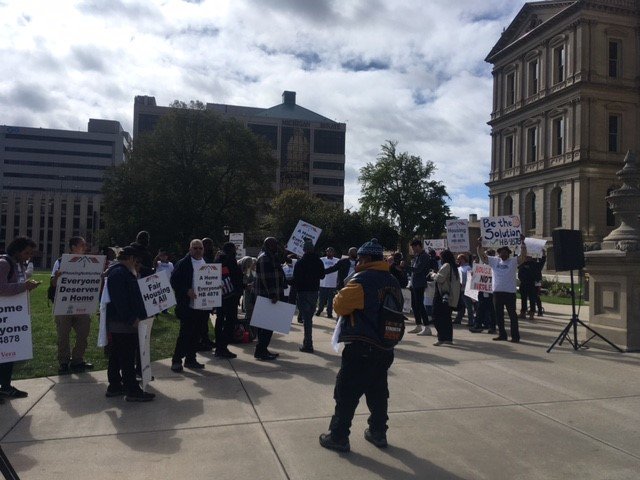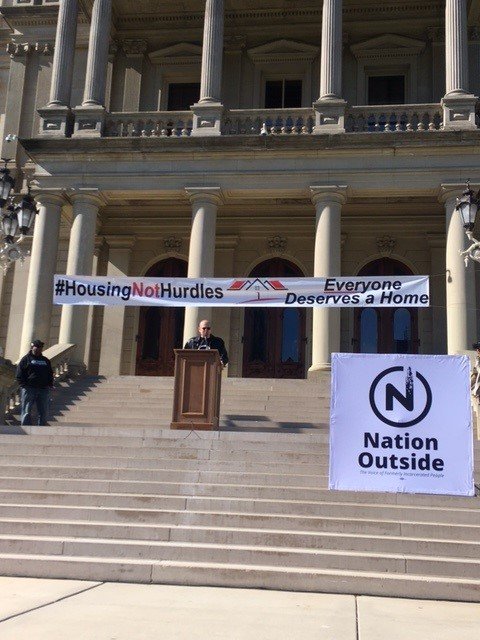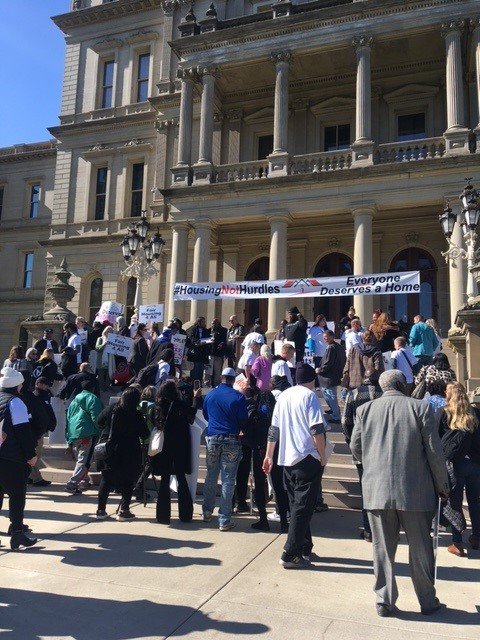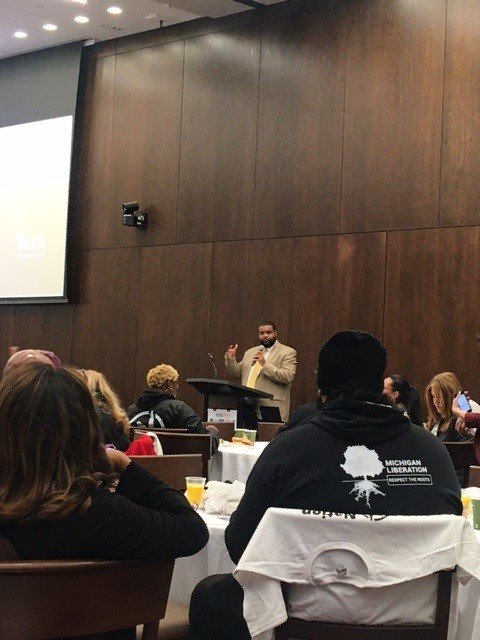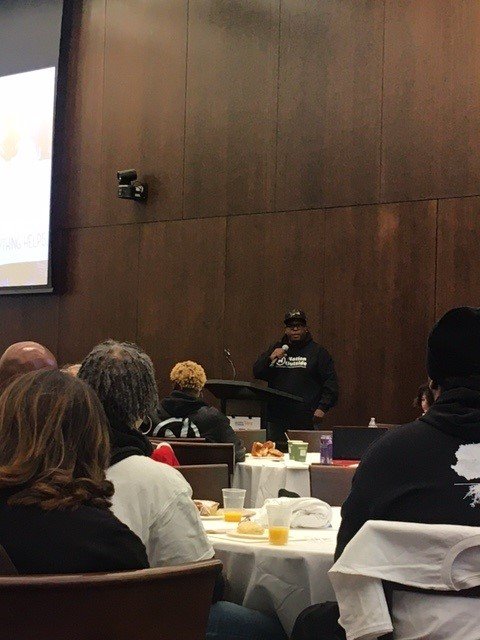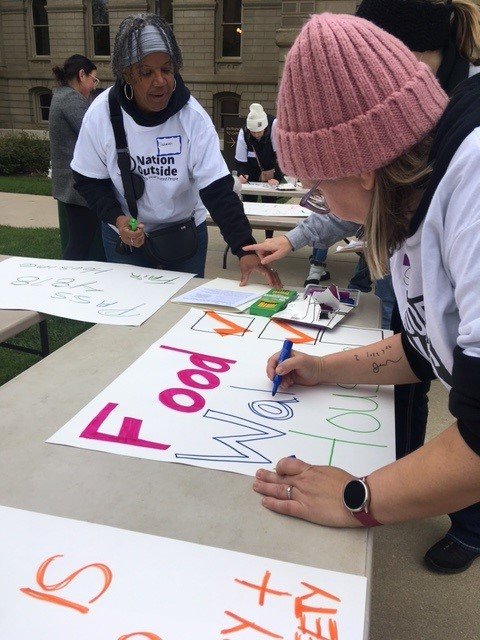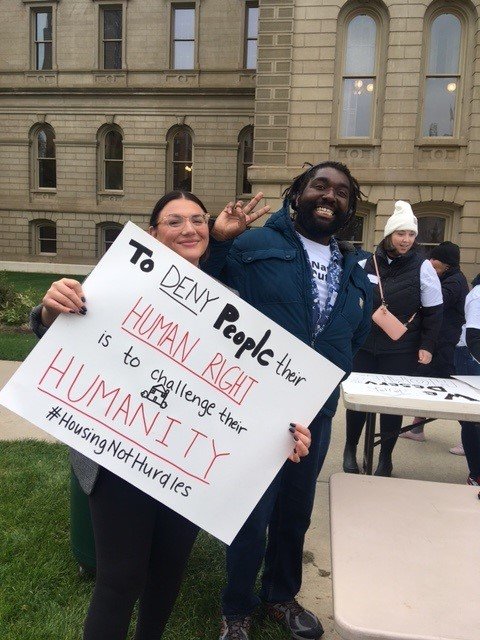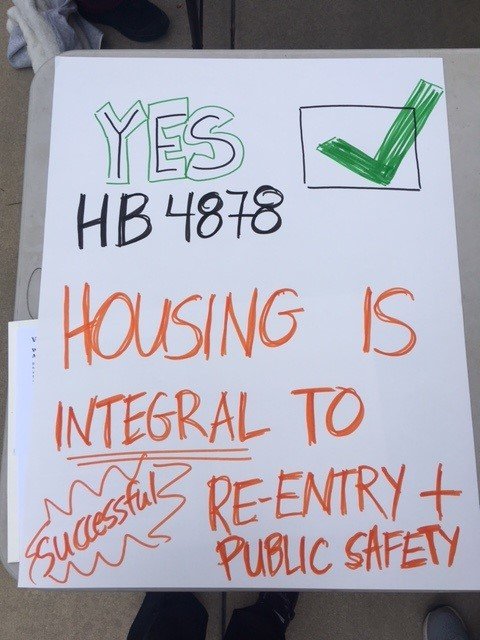Current Advocacy
Current Advocacy Opportunities
Advocacy is one of our many guiding principles. As such, we affirm that direct services to the people experiencing homelessness will include advocacy, and that the work of the Washtenaw Housing Alliance will include changing institutional policies and practices, training of professionals, policy and legislative change, educating funders, and raising hell when necessary.
Washtenaw Housing Alliance’s Policy Priorities
In partnership with WHA’s member agencies and our Advocacy & Communications committee members, we have outlined five key policy priorities that will inform our work in 2023. To learn more about these priorities, please click here for pamphlet pdf and here for plain text.
Local Advocacy Opportunities
-
On February 21st, 2025, the WHA joined Continuum of Care (CoC) partners to host a Community Debrief recapping the 100-Day Challenge we collaborated on between late September 2024 and January 23rd, 2025.
The Challenge, part of our community's work with the Built For Zero movement, was designed to bring together community leaders, service providers, advocates, and other individuals to accelerate progress on achieving an end to Veteran homelessness. Our goals were:Identify barriers Veterans face when seeking housing, specifically through feedback from Veterans with lived experience, and help remove those barriers.
Expand our community partnerships.
Engage with landlords willing to provide safe and affordable housing for Veterans.
Reduce the number of Veterans entering the homeless system through expansion of prevention and diversion services.
By the end of the Challenge, 25 Veterans experiencing homelessness were permanently housed. And! The number of unhoused Veterans tracked on our system's By-Name-List stayed under 20 during each month of the Challenge, down from the monthly high of 25 in 2023.
To read the full recap about the Community Debrief and the 100-Day Challenge click here.
-
It is going to take all of us working together to end homelessness in our community. Pledge your commitment to advocate and fight for affordable housing in Washtenaw County.
-
The Advocacy & Communications Committee is vital in supporting the WHA’s local, state, and federal advocacy actions as well as amplifying communication alerts. This committee typically meets virtually several times in the year.
-
On September 4th, 2024 the Winter Shelter Task Force presented to County Commissioners about shelter and warming center response plans for the upcoming winter season. The recording of the presentation as well as the full session can be watched here. The presentation slide deck can be viewed here.
The Task Force is a collaboration of over 25 individuals from close to 20 organizations and county offices who participate in the County’s Continuum of Care. It was created in April 2023 to:
Help analyze existing data and programs for winter shelter,
Research best practices for providing winter shelter in our Michigan climate,
Develop strategies and recommendations, and
Identify funding necessary to provide winter sheltering for all populations.
Following the Task Force's presentation last October, County Commissioners passed a resolution to support additional investments in homeless programs for that upcoming winter. WHA was grateful for the passing of the $2.18M resolution which supported investments in eviction prevention and shelter diversion, winter shelter staffing and support, and short-term hoteling. Thank you to everyone who supported our call for advocacy to help get this resolution passed!
-
On May 20th, the Ann Arbor City Council approved amendments to its FY 2025 City Budget. One significant amendment passed was to renew the Rising Hope for Housing Program through the appropriation of $500,000 from the FY 2025 Marijuana Excise Tax Rebate. This is existing news! Not only is the program renewed for a second year, but its funding allocation was increased by $100,000.
At the May meeting, Councilmember Harrison shared: “This year we are requesting an additional $100,000 from the Marijuana Excise Tax revenue, bringing our total to $500,000 for this program. As demand grows so must our support. The [Rising Hope Program] aiding those returning citizens fighting homelessness and recidivism is set to expand. We must meet this demand head on… We’ve heard the powerful voices of returning citizens and dedicated organizations. They’ve told us that sustainable funding is essential for continuous, effective support. Securing this funding will help us uphold our commitment to building a strong and inclusive community and continue to make meaningful and lasting impacts.”
The program’s renewal allows for grant partners A Brighter Way, Catholic Social Services Offender Success, Shelter Association of Washtenaw County, and SOS Community Services to continue providing comprehensive trauma-informed supportive services and case management for justice-impacted households who have housing choice vouchers. Separately, the Ann Arbor Housing Commission (AAHC) is the funding administrator and the WHA assists in facilitating coordination of the grant.
The Rising Hope for Housing program is open to receive referrals. For more information and to see if you may qualify, please check out the flyer below.
State Advocacy Opportunities
-
On December 30th, 2024 Governor Whitmer signed the source of income (SOI) non-discrimination Senate bills into state law (the House bills were signed on January 16th, 2025).
This new statewide law now makes clear landlords with five or more rentals must accept non-wage sources of income such as Housing Choice Vouchers (HCVs), veterans’ benefits, alimony, MDHHS cash assistance, or SSI/SSDI as part of a tenant’s legal total combined income. Previous to the law’s signing, this type of non-discrimination was only protected in the cities of Ann Arbor and Ypsilanti in Washtenaw County.
The bills analysis completed by the Michigan Senate Fiscal Agency can be read here.
The WHA recognizes that landlords and property managers/owners in our community may be unaware of the state law taking effect on April 2nd. If you would like more information and/or have questions about the new law, please reach out to us using the contact form here.
Landlords and tenants wanting more information about the new SOI law can register for these upcoming Fair Housing Center online events:
Register here for Fair Housing Center of West Michigan’s April 24th virtual workshop series 1-4:30PM
Register here for Fair Housing Center Metro Detroit’s May 13th webinar 10-11AM
You can also visit the Fair Housing Center of Southeast and Mid-Michigan‘s webpage explaining about the new state law (including a downloadable Fact Sheet). If you have any questions about your fair housing rights, please call their office at 877-979-FAIR (3247).
-
The WHA created the video Improving the Tenant Experience in Michigan to highlight what more can be done to improve a tenant's housing experience in our state. Certainly more affordable housing is needed, but so too are laws to protect tenants from "junk fees" when applying for or renting housing or even to expunge their eviction records from long ago.
-
Read recent progress update here.
In July 2024 MCTEH provided progress updates on its 2023-2025 State Action Plan. The MCTEH Action Plan outlines six (6) key goals that establish the parameters for what it will take to work toward ending homelessness in Michigan over the next three (3) years.
Federal Advocacy Opportunities
-
courtesy of Poverty & Race Research Action Council (PRRAC) and PolicyLink
In an “Interim Final Rule” published in the Federal Register on March 3rd, 2025, the Trump Administration put forth a meaningless new “definition” of the Affirmatively Furthering Fair Housing obligation, and removed all accountability provisions, including the weak system of reporting set up by the Clinton Administration back in 1994.
Of course, the 1968 Fair Housing Act is still in effect, and it is going to be up to advocates to challenge the policies that perpetuate separate and unequal communities.
In the meantime, some progressive state and local governments have adopted their own AFFH laws (including CA, NY, and MD), a trend which we hope will expand now that HUD has eliminated meaningful federal oversight.
For more information on the IFR, see this explainer from PolicyLink.
How can communities respond to protect fair housing rights?
Submit public comments on the new HUD AFFH Interim Final Rule!
Although the rule will be finalized on April 2, 2025, HUD is inviting public comment on the IFR for a 60-day period until May 2, 2025 and has stated that all feedback will be considered as part of its ongoing review to ensure consistency. Comments can be submitted to the Federal Register here.
To support stakeholders in the AFFH public comment process, PolicyLink developed a public comment guide for the Biden Administration’s 2023 Proposed AFFH Rule. While the substance of the 2025 IFR differs from the 2023 proposed rule, the guidance in this resource remains highly relevant. It provides essential tools to help individuals and organizations craft strong, equity-focused comments, including:
Strategies for advancing equity in public comments
An overview of the federal rulemaking and public comment process
A step-by-step guide to writing and submitting effective feedback
Key data sources to strengthen your comment
Sample language tailored for organizations across sectors
We encourage you to use this guide as a resource to amplify equity in the public comment process. Explore the full guide and access additional tools here:
-
courtesy of National Low Income Housing Coalition
What’s Happening:
HUD’s (U.S. Department of Housing and Urban Development) approximately 8,300 employees are responsible for managing affordable housing programs that serve millions of people nationwide, including children, veterans, seniors and persons with disabilities. The administration has asked HUD to cut its workforce by about half, with deep cuts in field offices nationwide and threatened reductions to programs and funding.
Staff and funding cuts to an already under-resourced HUD will reduce government efficiency, increase housing instability and homelessness (especially for low-income families and individuals), and worsen an already historic national affordable housing crisis.
On Monday, March 10th, organizations and people all over the country took action to protect HUD and the affordable homes it makes possible. You can still take action after March 10th by continuing to call your Senators and Representatives!
Ask them to stop harmful cuts of HUD staff and funding! Large and thoughtless cuts will damage communities and worsen our national affordable housing crisis. Use the following talking points you can use, and feel free to add your own stories of lived experience!
HUD staff and programs are essential to local affordable housing! Affordable housing providers need a fully-staffed and resourced HUD to ensure timely payments to landlords and vendors, inspect properties, work with landlords, and more. Less staff at HUD will result in longer housing waitlists, less efficient payment and procurement, and more uncertainty for private landlords who accept tenants with vouchers. In addition, rehabilitation and modernization of public housing units will slow down, as will the work of supporting local operations and protecting residents.
HUD staff and funding cuts hurt our communities! Millions of people nationwide rely on HUD programs for housing and services, and on the work of thousands of hardworking local HUD employees. Large cuts to HUD staff will result in payment delays, inspection slowdowns and jeopardize the housing of people who currently use HUD programs and those who are on waitlists. Cuts to their homes and remaining on waitlists. The private market will not be able to keep up with housing demand. Low- and moderate-income residents will suffer first and hardest.
HUD staff and funding cuts hurt local economies! Residents, local housing and community development agencies, landlords who accept Housing Choice Voucher tenants, developers, lenders, construction firms and many other business partners will be hurt by any slowdown or shutdown of HUD programs and services. In addition, thousands of HUD employees in field offices all over the country will be unemployed.
Want to find out how many people in your state and Congressional district are supported by federal housing programs, or how much money is allocated from specific federal subsidized housing programs in your state? Use this Federal Housing Funding Tracker to support your case.
Here’s How to Contact Your Members of Congress:
You can connect to any Capitol Hill office using the U.S. Capitol Switchboard at (202) 224-3121. If you would rather call an office directly, you can typically find the number on your senator or representative’s website. When you call, a staff member will answer to take your message.
Not sure who your members of Congress are? You can find them using this website: http://www.usa.gov/elected-officials.
National Sign-On Letter:
Don’t want to call your elected officials? Ask your organization to sign onto this national letter https://nlihc.quorum.us/campaign/111236/, or sign onto this individual one yourself: https://nlihc.quorum.us/campaign/109331/.
-
In fiscal year 2024, Congress approved and the Biden administration awarded $3.6 billion of competitive federal grants, which include funds for veterans experiencing homelessness, rapid rehousing and permanent supportive housing, youth homelessness and domestic violence shelters. The money was set to go out throughout 2025 and 2026, depending on when individual grants were set to renew. As of March 2025 none of the grant funds awarded on January 17th have officially been made available. Read more in Shelterforce‘s February 2025 article, HUD Staff Cuts and Grant Delays Endanger Homelessness Services.
We must all urge Congress to direct HUD (U.S. Department of Housing and Urban Development) to deliver critical FY24 Continuum of Care program funds immediately to the communities that need them!
Take action with National Alliance to End Homelessness here: endhomelessness.org/actions/act-now-federal-homelessness-funding-still-at-risk
-
Anticipating possible raids seeking undocumented immigrants by Immigration and Customs Enforcement (ICE) agents at homeless service providers and shelters, the National Homelessness Law Center (NHLC) offers practical guidance for service providers about what to do before, during, and after any such attempted raid to protect both your staff and clients from harm.
What to do Before an Enforcement Action:
Understand current NHLC Guidance and provide training on the basics to Staff
Designate space as public and non-public accordingly
Understand the difference between a judicial warrant and an ICE administrative warrant
Understand how to handle the collection and retention of client information
Understand how to respond to requests for information for immigration enforcement purposes
Put up Know Your Rights poster (Exhibit to NHLC Guidance)
What to do During an Enforcement Action:
Stay calm, treat the officers with respect, and notify a supervisor
Document the officers’ names and badge numbers
Inform the officers that they do NOT have consent to enter private areas
If they claim to have a warrant to enter, ask to see it and check that it is signed by a Judge or Magistrate
OK to Remind clients of their right to remain silent and to speak with a lawyer if detained or arrested
OK to Videotape but do not interfere with the officers
What to do After an Enforcement Action:
Document the actions taken by ICE
Date/Time of Action
How many agents/Names/Contact information
How did the agents’ uniforms identify them? ICE or police?
Why did they say they were at the facility?
Did you ask to see a judicial warrant?
Did you deny consent to enter?
Use the ICE/Police Immigration Enforcement Report Form (Exhibit in the NHLC Guidance)
Best way to make sure your organization’s response to ICE doesn’t feel like an emergency, is to make a routine preparing all service provider staff in knowing what to do. Practice, practice, practice!
-
On June 28th, 2024 the Supreme Court of the United States announced its decision in the case of Johnson v. Grants Pass. SCOTUS ruled in favor of the City of Grants Pass, Oregon. Under the ruling, localities will be able to arrest, ticket, and fine people for sleeping outdoors on public property, even if leaders have failed to produce enough affordable housing or shelter for everyone in the community who needs it. In her dissent, Justice Sotomayor stated, "...the majority focuses almost exclusively on the needs of local governments and leaves the most vulnerable in our society with an impossible choice: Either stay awake or be arrested."
“This decision sets a dangerous precedent that will cause undue harm to people experiencing homelessness and give free reign to local officials who prefer pointless and expensive arrests and imprisonment, rather than real solutions,” said Ann Oliva, CEO of the National Alliance to End Homelessness (NAEH). Read NAEH's factsheet for more information about the importance (and cost savings) of investing in Housing First initiatives rather than inflict punishment on those experiencing homelessness.
There are many proven and data-backed solutions to homelessness, like providing people with housing and services. Arresting or otherwise punishing homeless folks is not a solution, and jails and fines make the cycle of homelessness worse. In response to the ruling, the National Homeless Law Center held a webinar to provide guidance on where we all go from here: watch here.
-
As part of the National Low Income Housing Coalition’s 2024 Housing Policy Forum, homeless and affordable housing advocates joined together to participate in Capitol Hill Day on March 21st, 2024. Close to 400 participants schedule as many as 200 meetings with their U.S Senators and Congressmembers.
The WHA joined 18 other staff from Michigan-based organizations to connect with our elected representatives. At the meetings we urged our reps to provide the highest possible funding for HUD’s vital affordable housing and homelessness programs in FY2025 as well as to cosponsor three (3) important Senate/House Bills highlighted in NLIHC’s Legislative Priorities for the year. In addition, we jumped into the audience for two press conferences happening on the Hill: the Renters Caucus announcement of the first-ever Renters Agenda and the relaunch of the Green New Deal for Public Housing.
Advocacy Resources:
-
Homes Guarantee is an historic campaign organizing for a National Tenant Bill of Rights. Everyone living in the U.S. should have safe, accessible, sustainable, and permanently affordable housing: a Homes Guarantee. This includes tenants like renters, unhoused people, and mortgage holders.
What's your boldest vision for a National Tenants' Bill of Rights? Share your vision here. Want to host your own Imagination Session with friends, family and neighbors? Download the toolkit here.
-
NLIHC released a toolkit offering recommendations for lawmakers working to enact eviction record sealing and expungement legislation in their jurisdictions. Read more and download the toolkit here.
-
NAEH provides the most important legislative priorities in real time. Sign up for NAEH’s advocacy alerts here.
-
Fair Housing Center of Southeast and Mid-Michigan has several advocacy opportunities to support. Consider volunteering as a civil rights tester or represent FHC as a cooperating attorney. Find out more information at fhcmichigan.org/get-involved.
-
MCAH is helping to engage low-income and housing insecure individuals with registering to vote (registration application here). From 2010 to 2020, individuals earning over $100k were twice as likely to vote as individuals earning under $20k, and only around 10% of homeless individuals voted. Let’s make sure everyone’s voice is represented. Election Day is Tuesday, November 5th, 2024.
Voter registration deadlines in Michigan:
Online registration deadline: 15 days before Election Day
Register by mail deadline: Must be postmarked 15 days before Election Day
In person registration deadline: Available up to and including on Election Day
Recent Successes
The Washtenaw Housing Alliance thanks its member agencies, partners, and the broader local community for their ongoing participation in our advocacy efforts and their unwavering commitment to ending homelessness and realizing a home for everyone in Washtenaw County. We also thank the many local policymakers who have supported affordable housing and homelessness prevention policies, programs, and funding.
-
County Commissioners passed a resolution to support additional investments in homeless programs for the 2023-2024 winter at their Wednesday, November 1st, 2023 meeting. WHA is grateful for the passing of the $2.18M resolution which will support investments in eviction prevention and shelter diversion, winter shelter staffing and support, and short-term hoteling. Thank you to everyone who supported our call for advocacy to help get this resolution passed! Read more…
-
On March 21st, 2023 the City of Ann Arbor’s Planning Commission voted unanimously to approve the site plan for WHA member agencies’ Ann Arbor Housing Commission (AAHC) and Avalon Housing 70-unit mixed-use affordable housing development at 121 S. Catherine Street. Read more here on the community engagement process that is guiding the property’s development in the historic Black business district in Kerrytown.
Ypsilanti City Council approved the second and final reading of the PILOT for the 206-210 N. Washington Street development on April 4th, 2023. City Council’s approval enables Avalon Housing to move forward on their plans to bring 22 new one-bedroom apartments to this property site. All units will be affordable and some are set to become supportive housing, providing built-in services like medical care, education and job training as well as transportation particularly for those exiting homelessness. Developers expect to break ground in early 2024.
Read more on this exciting affordable housing project from The Michigan Daily: Everything you need to know about affordable housing at 121 Catherine St (February 19, 2024) and from MLive: Ann Arbor to break ground on Kerrytown affordable housing development in spring (February, 5, 2024).
-
The Washtenaw County Board of Commissioners reviewed and approved funding for seven (7) agencies to receive New Human Services Partnership (NHSP) - Safety Net grants (see the Resolution with award grants here). Due to advocacy from WHA and our partners, the Board also approved new, continued funding for 6-months for agencies previously funded through the Coordinated Funding model and which were not recommended for NHSP awards. Here is the resolution, that was introduced and approved during that meeting, which provides the continued funding for agencies for another 6-months.
-
Ann Arbor City Council voted to allocate the $24M in American Rescue Plan Act (ARPA) funding and as part of that package, they supported:
$1M for housing for the homeless
$3.5M for property acquisition for affordable housing, including up to $500,000 for supportive services for tenants
$1.68M in additional funding for Coordinated Funding support
As well as $3.5M for an unarmed police response, and $1.6M for a basic income pilot program!
In the same April session, City Council also voted to rezone the Old Y-Lot at 350 S. Fifth as a Planned United Development (PUD), making it possible to move forward with development that will create more new affordable housing units!
-
Ann Arbor voters passed the Affordable Housing Millage with 73% support! Prop-C provides a 20-year, 1-mill tax for affordable housing and related services that will generate approximately $6.5M in funding. It provides funding to create approximately 1,500 units of affordable housing, with a portion dedicated to those in need of permanent supportive housing. Thank you to all who donated their time, talent and treasures to ensure the passage of Proposal C, including WHA staff, Board members, member agencies, volunteers, and supporters. We also want to thank everyone involved with Partners for Affordable Housing for running an incredible campaign!
